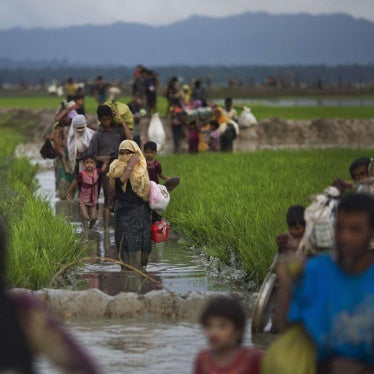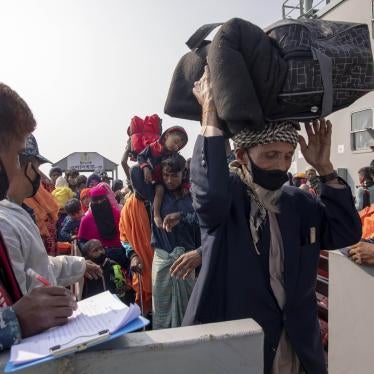(Bangkok) – One million Rohingya refugees in Bangladesh face little prospect of safely returning home, six years since the Myanmar military launched a campaign of mass atrocities in Rakhine State on August 25, 2017, Human Rights Watch said today. The United Nations Security Council has failed to hold Myanmar’s generals accountable for crimes against humanity and acts of genocide against the Rohingya.
Over 730,000 Rohingya who fled to Bangladesh in 2017 now live in sprawling, overcrowded camps under growing restrictions by the authorities and spiraling violence by armed groups. About 600,000 Rohingya remain in Myanmar, effectively detained by junta authorities under a system of apartheid.
“Rohingya on both sides of the Myanmar-Bangladesh border are trapped in stateless purgatory, denied their most basic rights, awaiting justice and the chance to go home,” said Shayna Bauchner, Asia researcher at Human Rights Watch. “Instead of addressing these issues head on, UN Security Council inaction and government aid cutbacks are leaving Rohingya in even more desperate straits.”
Rohingya in both Bangladesh and Myanmar describe a pervasive sense of hopelessness that grows each year as restrictions increase and conditions deteriorate on both sides of the border, Human Rights Watch said.
Since the February 1, 2021 military coup in Myanmar, security forces have arrested thousands of Rohingya for “unauthorized travel” and imposed new movement restrictions and aid blockages on Rohingya camps and villages. The junta’s systematic abuses against the Rohingya amount to the crimes against humanity of apartheid, persecution, and deprivation of liberty. More than three months since the deadly Cyclone Mocha struck Rakhine State, the junta continues to block lifesaving humanitarian aid, including urgently needed medical care for communities experiencing dengue and malaria outbreaks.
Rohingya refugees in Bangladesh describe new barriers to education, livelihoods, and movement that are similar to the restrictions they faced in Myanmar. Bangladesh authorities have also moved about 30,000 Rohingya to the isolated silt island Bhasan Char, where they face movement restrictions and food and medicine shortages.
Without recognized legal status in Bangladesh, Rohingya refugees are on a precarious footing under domestic law, making them vulnerable to rights violations. “We have lost six years here,” a Rohingya woman told Human Rights Watch. “I am human. Why have I been treated this way throughout my life? I have millions of these thoughts every day.”
Amid surging violence by armed groups and criminal gangs in the camps, Bangladesh authorities are failing to provide protection, maintain security, or prosecute those responsible. Refugees report facing layers of barriers to police, legal, and medical assistance.
Bangladesh authorities have imposed restrictions on community-led schools since December 2021. “The prolonged refugee situation, lack of access to education and work, and ongoing violence are leaving us hopeless,” a Rohingya community leader said. “We are struggling to see a way out. We want to build better lives but can’t. The lack of education is keeping us from building skills and knowledge. The education gap in our community is growing.”
Camp authorities have recently resumed harassing and evicting Rohingya shop owners, including destroying their stores, a practice that began in December 2021. “First they surround us with fencing, now they’re shutting down our small businesses and stopping us from going outside to work,” one refugee said. “They also stopped local vehicles from operating in the camps, which was the only way that some older people, pregnant women, and people with medical crises could move around. Now we have to walk four to five kilometers just to collect rations.”
The 2023 UN Joint Response Plan for the Rohingya humanitarian crisis has received less than one-third of the US$876 million sought in donor contributions. The funding shortfall has led the World Food Programme (WFP) to cut Rohingya food rations by a third since February, down from $12 to only $8 a month, increasing malnutrition, disease, and desperation among refugees. Rohingya and humanitarian workers report that the ration cuts are already having medical and social consequences.
“With the ration cuts, we don’t have enough food to serve ourselves,” a Rohingya volunteer said. “Think about the little kids in our families or the pregnant women. They’re all affected.”
Donors, including the United States, United Kingdom, European Union, and Australia, should increase funding and pressure to meet the needs of the Rohingya refugee population. They should urge Bangladesh to reverse its restrictions so that refugees have access to the necessary tools for rebuilding their lives. Countries should also increase resettlement opportunities for Rohingya, particularly those who have been targeted by armed groups, who not only fear persecution at home in Myanmar but also threats to their lives in the camps.
The prospect of durable, voluntary returns has grown ever more distant since the military coup in Myanmar, carried out by the same generals who orchestrated the 2017 mass atrocities.
Bangladesh authorities contend that the repatriation of Rohingya is the only solution. The government has initiated steps with the Myanmar junta to return Rohingya to Rakhine State under a pilot project that has been marked by coercion and deception.
The UN and concerned governments should continue to underscore that conditions for the safe, sustainable, and dignified return of Rohingya do not currently exist. Rohingya refugees have consistently said they want to go home, but only when their security, access to land and livelihoods, freedom of movement, and citizenship rights can be ensured. “The toll of displacement has tested our resilience and strength over these six years,” one refugee said. “I dream of being able to go back to my own country Myanmar, to my village and home, with full rights of citizenship and everything else that a person deserves.”
The international response to the 2017 atrocities was fragmented and halting, with the UN Security Council doing little more than issuing a handful of statements. The council should take concrete, meaningful action, including instituting a global arms embargo, referring the country situation to the International Criminal Court (ICC), and imposing targeted sanctions on junta leadership and military-owned companies.
“Moving ahead with repatriating Rohingya now would mean sending refugees back to the control of a ruthless and repressive junta, setting the stage for the next devastating exodus,” Bauchner said. “Building conditions for the voluntary, safe, and dignified return of Rohingya will need a coordinated international response to establish rights-respecting civilian rule in Myanmar and achieve justice for past atrocities.”







